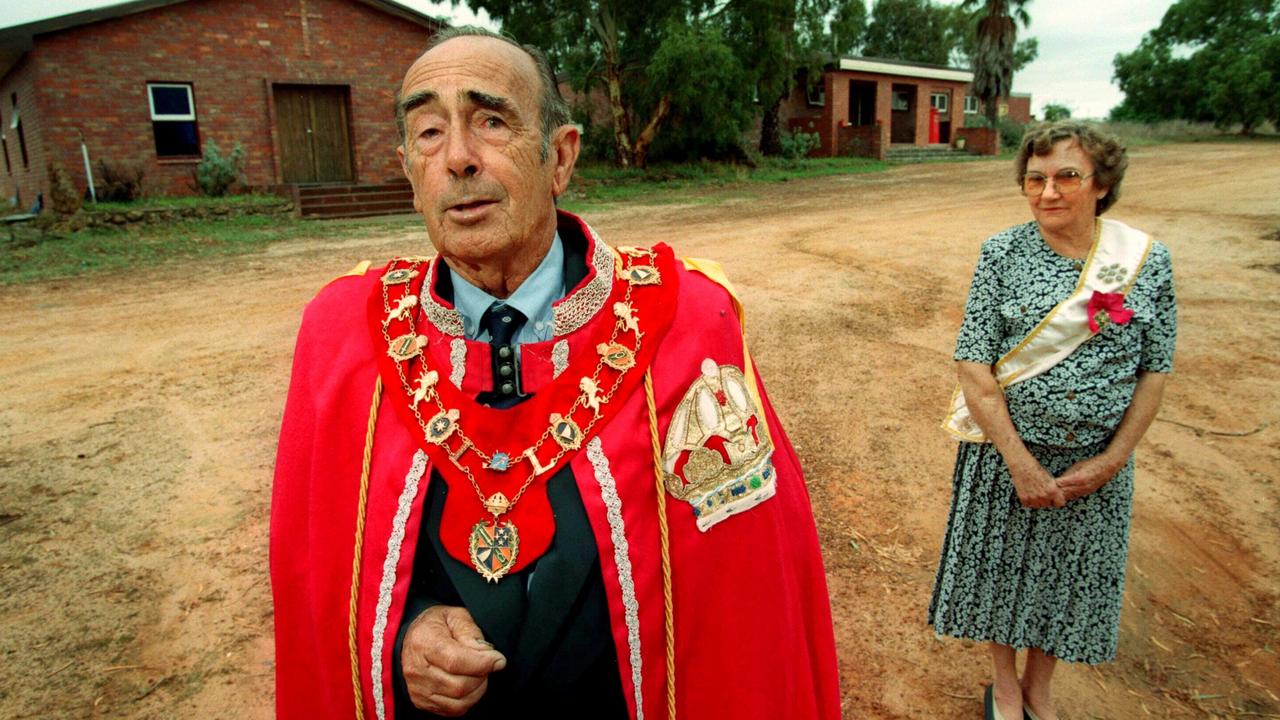‘Objectively nonsense’: Sovereign citizen ‘pseudo-law’ arguments clogging up Australia’s courts
A sovereign citizen’s bid to get out of a mortgage after defaulting has been roasted as “objectively nonsense” by a fed-up judge.
Economy
Don't miss out on the headlines from Economy. Followed categories will be added to My News.
Just before Christmas, a court in Western Australia heard what should have been an otherwise run-of-the-mill mortgage repossession case.
Suncorp Bank was seeking to repossess a home in Thornlie in Perth’s southeast, after its owner defaulted on the $400,000 mortgage in 2022 — before passing away the following year, delaying proceedings.
In documents filed with the court prior to his death, Stevan Gordon Fish expressed what Supreme Court of WA Justice Michael Lundberg described as a “nonsensical view of the essential framework of our legal system, sometimes conveniently referred to as the ‘sovereign citizen’ movement”.
“Much of the affidavit material and the accompanying submissions are, objectively, nonsense,” Justice Lundberg said.
Styling himself as “Stevan Gordon of the family Fish, a living man, loyal subject of the crown, (Charles the Third, by the Grace of God of the United Kingdom of Great Britain and Northern Ireland and of His Realms and Territories King, Head of the Commonwealth, Defender of the Faith)”, Mr Fish and later his partner, Ainslie Kounis, appeared to “share a similar view as to the applicability to them of the laws of this country, and the applicability of those laws to the financial and property arrangements between Mr Fish and the plaintiff lender”.

“In her most recent affidavit dated November 20 2024, which consists of 42 pages of closely typed material, Ms Kounis asserts that the plaintiff, the plaintiff’s solicitors and, quite remarkably, this Court are, in truth, liable for the debts of the defendant,” Justice Lundberg said.
“Having reviewed this material, it is unnecessary to recite the extensive pseudo-legal journey that Ms Kounis invites the Court to follow, commencing with the Laws of God, then to the Magna Carta of 1215, the first five books of the King James Bible of 1611, various English statutes from the 17th and 18th centuries, isolated quotes from Blackstone’s Commentaries, a review of the constitutionality of income tax laws in this country, and several High Court authorities, all taken out of context.”
Such cases, whether brought, argued or defended by so-called sovereign citizens or other adherents to what’s known more broadly as ‘pseudolaw’, are increasingly clogging up Australian courtrooms and exasperating judges.
Sovereign citizens are a fringe, anti-government legal movement who erroneously believe laws and regulations have no jurisdiction over them.
Its adherents often film their interactions with police or other authorities, reciting its phrases and forms like magical incantations.
“It emerged in the US in the ‘60s, ‘70s, ‘80s and ‘90s from a few different right-wing groups — [people] keen on the right to bear arms, tax protesters, the common law court movement [which] is this idea that the law has been corrupted and should return to Biblical principles,” said Harry Hobbs, Associate Professor in the University of Technology Sydney Faculty of Law and author of Pseudolaw and Sovereign Citizens.

“Over the course of this period these very amorphous groups involved in pseudolaw crystallised into what we would call sovereign citizens.”
Australia has seen various incarnations of similar ideas over the years.
In 1970, farmer Leonard Casley famously declared that his small farm at Hutt River, 500-kilometres north of Perth, was a sovereign state not subject to Australian laws.
In the ‘90s, an Aussie man was declared a “vexatious” litigant by the High Court over his years-long crusade seeking to argue Australia’s paper currency was not legal tender.
The more recent, US-style variant began to gain popularity in Australia after the global financial crisis, when a number of American proponents embarked on speaking tours Down Under.
“They would conduct seminars telling people how to get out of paying their mortgage, not have to register their car or get a driving licence,” Prof Hobbs said.
“It was a concerted effort by some people who saw an opportunity to make money, and some people who just genuinely believe this stuff and wanted to help people with a way out of their problems.”
Covid restrictions sparked another surge in sovereign citizen activity, fuelled by the rise of the internet and social media.
In Australia and New Zealand, there has also been a growing link between sovereign citizen and Indigenous land rights movements.
To date, there has not been a single case — whether in Australia, the US, Canada, New Zealand or the UK — where their arguments have been successful.
Queensland District Court Judge Glen Cash, in a paper prepared for the 2022 Queensland Magistrates’ State Conference, urged courts to seek to understand so-called OPCA (organised pseudolegal commercial arguments) litigants.

“What is their motivation for embracing pseudolaw?” he wrote.
“Often the answer is the same. They are persons who feel they are disenfranchised or marginalised. They are in a position of relative disadvantage in society and pseudolaw presents an opportunity to take control. Pseudolaw is the ‘inside knowledge’ that permits the OPCA litigant to command a power kept secret from others. Such can drive some litigants into a fervent, if not febrile, pursuit of what they perceive as ‘justice’.”
Writing in the UNSW Law Journal last year, Prof Hobbs along with Stephen Young from the University of Otago and Joe McIntyre from the University of South Australia explained the broad pseudo-law concepts while also offering suggestions for courts “increasingly confronted with pseudolegalese”.
“Pseudolaw has a tendency to transform routine and relatively simple legal issues into much more complex and harmful ones that can hurt litigants, their families and friends, and, indeed, the legal system at large,” they wrote.
“Litigants waste time and money and forego the opportunity to obtain capable legal representation. It also creates opportunities for scammers and charlatans, who convert individuals to sovereign citizen causes for their own personal aggrandisement or benefit.”
But what exactly are their arguments? Judge Cash likened pseudo-law to “a kind of magic”.
“Ritual and ceremony have long been at the heart of pseudolaw ideology,” he wrote.
“Documents are marked with sigils and signs. Written submissions bear the appearance of incantations. Statutes are parsed to discover hidden meaning and codes.”
Prof Hobbs suggests the “fascination with obscure and quasi-legal terminology” stems from a “nostalgic form of legal thinking”.
“Returning us to a time when the law was good and true and the state not as corrupted,” he said. “They love things like the Black’s Law Dictionary, a Revolutionary-era law dictionary, they try to draw on older legal instruments and adopt that particular phraseology.”

Here is a quick guide to sovereign citizen lingo.
‘Living man’
Sovereign citizens will frequently refer to themselves as “living man” or “living woman” such-and-such.
In writing, they might adopt unusual punctuation, spelling or capitalisation of their name.
The idea comes from the “strawman” or “split-person” argument — the most prominent sovereign citizen belief — which maintains that there is a distinction between the artificial legal entity represented on a birth certificate, driver license or other government document, and the actual physical person.
“If you’re a ‘living’ person you’re removing yourself from the government’s control,” said Prof Hobbs.
As former WA Supreme Court Justice Rene Le Miere put it in a 2017 case involving the Casley family, “The idea is that an individual’s debts, liabilities, taxes and legal responsibilities belong to the straw man rather than the physical individual who incurred those obligations, conveniently allowing one to escape their debts and responsibilities. It is all gobbledygook.”
‘I do not consent’
A closely related concept is the idea that, if the sovereign citizen does not “consent”, then the law or contract does not apply to them.
“This form of argument begins from the position that all legislation or authority is a form of contract or predicated on contractual relations,” the UNSW authors write. “Because a sovereign citizen has not agreed to that contract, they have not consented to the authority of the jurisdiction. Therefore, the law does not apply to them.”
A number of sovereign citizens have unsuccessfully argued this angle before Australian and New Zealand courts, in some cases seeking to escape driving fines as they did not “consent” to traffic laws, or even that the defendant did not “consent” for his name to appear in charging documents.
The authors point out, rather obviously, that “the central problem with this type of argument is no one needs to explicitly and affirmatively consent to the authority of a jurisdiction to be subject to it, especially for purposes of tax or criminal law”.
Magna Carta
The third major theme of pseudolaw arguments is that the relevant law is “invalidly enacted or defective and thus without legal effect”.
Sovereign citizens will frequently cite from an eclectic mishmash of historical documents — seemingly none more popular than the Magna Carta.
“The Magna Carta was essentially a peace treaty between King John and his rebel barons in 1215,” said Prof Hobbs.
The original document was annulled by the Pope within a year and civil war ensued, but several revised versions were later issued and the version that eventually became part of England’s statute books was issued by Edward I in 1297.
The Magna Carta does not have any force in Australia, as its functions have all been superseded by legislation.
Still, the Magna Carta is frequently invoked “perhaps because of its mythic status” — such as in two separate cases in the ‘90s, when appellants sought court declarations that they did not need to pay their mortgage because the Magna Carta guaranteed their rights “to their matrimonial home”.
“It’s an 800-year-old document written before a time people even knew there was such a country as Australia, but it’s come to stand as a sort of moral and political document rather than a legal one,” said Prof Hobbs.
More Coverage
Originally published as ‘Objectively nonsense’: Sovereign citizen ‘pseudo-law’ arguments clogging up Australia’s courts








